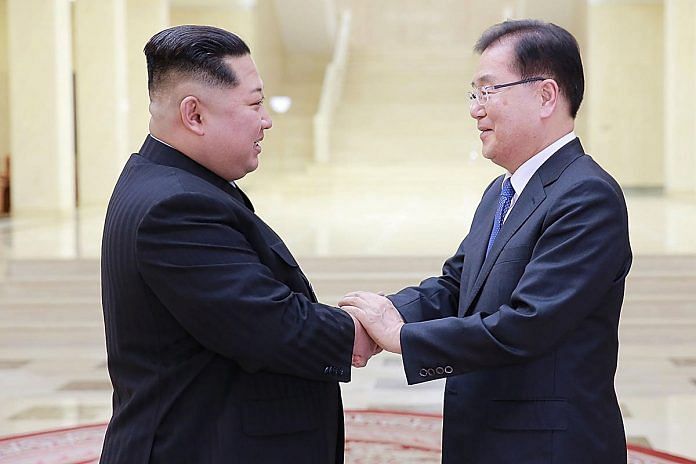The Olympics seem to have worked
North Korea has apparently agreed to enter into a dialogue with the United States about abandoning nuclear weapons, which comes as welcome news, the New York Times editorialises.
“The news that North Korea’s leader, Kim Jong-un, had agreed to discuss ending his nuclear program in exchange for security guarantees and that he would suspend tests of weapons and missiles during negotiations came from senior South Korean diplomats after discussions in Pyongyang with Mr. Kim. They were the first representatives of the South to meet with Mr. Kim since he came to power six years ago. While the North has not yet made its own statement on the talks, the fact that the South Korean delegation met directly with Mr. Kim was significant.”
“North Korea’s position seems to be the same as it has been — that it would have no need for nuclear weapons if it faced no threat from the United States, including the American military presence in the South.”
“One question is what the North Koreans might demand in return for halting the testing and entering into talks,” the New York Times writes. “Unfortunately, there is no evidence of the United States having any mechanism to implement a strategy for talks. There is no American ambassador in Seoul, and Secretary of State Rex Tillerson has so eviscerated the State Department that he may not be capable of effectively moving forward.”
“That will require creative and sustained diplomacy, toughness, patience and a president who can be disciplined enough to keep his thoughts about the situation off Twitter. It should be obvious that a hope for peace, no matter how tenuous, is more welcome than the threat of war.”
The democratic Crocodile
Zimbabwe’s new president, Emmerson Mnangagwe (also known as the Crocodile) claims to be a democrat, but The Economist questions whether this is true.
“He has made some sensible noises, promising to amend a law that declares that businesses should be at least 51% owned by black Zimbabweans or the state. He wants to compensate the 4,000-plus white farmers whose land has been confiscated since 2000, and re-establish property rights (up to a point) by providing 99-year leases to commercial farmers, white and black. He has promised fair elections and says he and his party will bow out if they lose,” the Economist concedes.
“But old worries are creeping back. Is Mr Mnangagwa master or servant of the generals who made him president? Whereas many hoped he would widen his cabinet and kick out the worst rascals, he has kept some of the nastiest of the old guard. Constantino Chiwenga, the army commander who led the coup, is his vice-president.”
The most important question is the elections, which remain uncertain. “If it is a tight race, the ultimate question is whether the army will hold back. The new head of the electoral commission admits that 15% of the commission’s staff are retired military officers. In previous elections, army commanders declared that they would never serve under the MDC. Mr Mnangagwa insists that the generals are not involved in politics and that “those statements are dead.” But he rejects the idea that General Chiwenga and the new head of the army should publicly say so.”
“Zimbabwe is in for a nervous few months,” the Economist writes.
The Emperor’s new clothes
Xi Jinping’s move to abolish term limits in China means that he will likely be China’s ruler for the rest of his life, turning an instituionalised autocracy into a personal one, writes Francis Fukuyama in the Washington Post.
“The rules that have just been tossed out the window were the result of China’s own painful experience during the Cultural Revolution. The weakness of the country’s traditional authoritarian political system has for centuries been called the “bad emperor” problem.”
“The last bad emperor that China had was Mao Zedong. Mao liberated the country from foreign occupation but then went on to trigger two enormous catastrophes: the Great Leap Forward starting in the late 1950s and the Cultural Revolution starting in the late 1960s. The latter set China back a generation and scarred the elites who endured it. Collective leadership emerged as a direct reaction to that experience: Deng Xiaoping and other senior leaders of the party vowed that they would never let a single individual accumulate as much charismatic power as Mao,” writes Fukuyama.
“How bad China’s current emperor will be has yet to be determined. So far, he has crushed the hopes of many Chinese for a more open, transparent and liberal society. He has emphasized the party over the country, cracked down on the slightest instances of dissent and instituted a social credit system that uses big data and artificial intelligence to monitor the daily behavior of the country’s citizens.”
“As such, China under Xi may end up showing the world the unimagined forms that a 21st century totalitarian state can take,” he writes.



